Does King Charles’ Royal Family Have a Future?
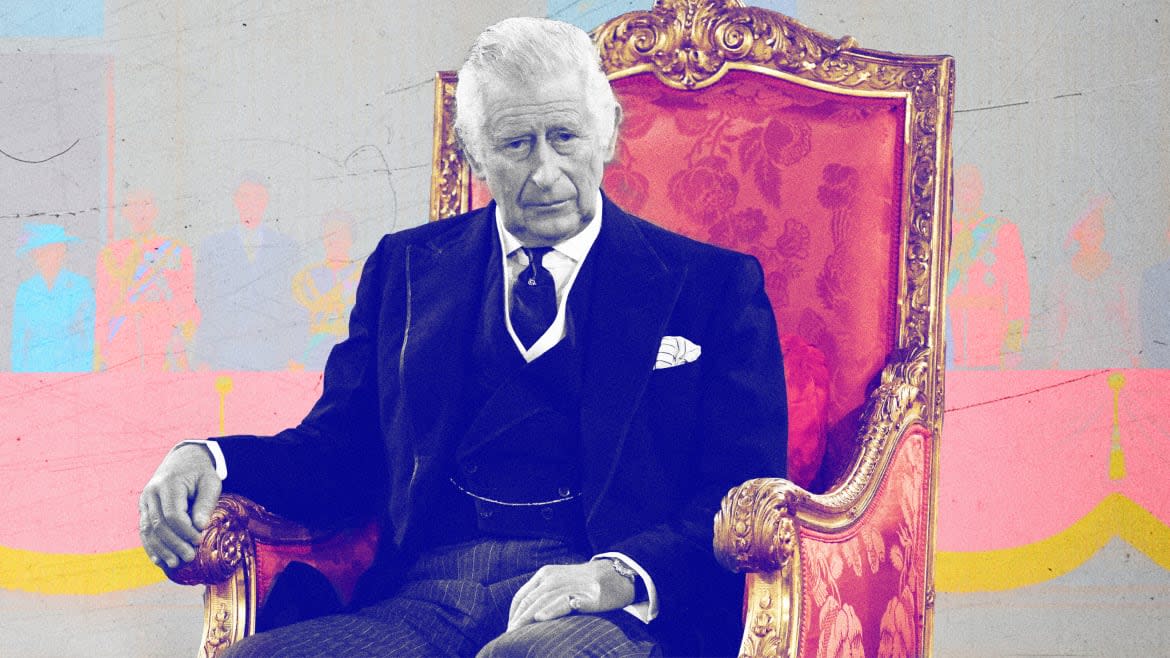
- Oops!Something went wrong.Please try again later.
- Oops!Something went wrong.Please try again later.
- Oops!Something went wrong.Please try again later.
For people beyond Britain the story of the House of Windsor more often feels like the world’s most compelling soap opera rather than reality—or a heady mixture of both.
In the latest episodes over Christmas, the Windsors played the continuity card, with pretty outfits, good deeds, and a united front being presented against Prince Harry and Meghan Markle’s outlining of grievances in their Netflix documentary, and the imminent storm about to break over Harry’s memoir, Spare, out Jan. 10. The message of Christmas was: Queen Elizabeth may be dead, but, with a reshuffling of lead characters, the soap opera continues.
King Charles Faces ‘Difficult’ First Christmas Leading ‘the Firm’
Prince Andrew was described as being almost fully excommunicated from the royal family, then pictured alongside them on Christmas Day—with sources revealing to The Daily Beast he would still be barred from official duties for the foreseeable future. King Charles led the family on the Sandringham walk for the first time; now the question is what will his brand of monarchy look and sound like?
For the Brits themselves, though, following the death of the longest-reigning monarch and the accession of a new king, the royal family has become part of a national turmoil in which the fate of an ancient national institution and the most lavish of surviving royal dynasties is in the balance. The Daily Beast asked two of its regular scrutineers of the monarchy, Tom Sykes and Clive Irving, to unpack a momentous year and debate what happens next.
Clive: Covering the royal family this year has been a challenge. The inconsequential has drowned out the consequential, particularly the Harry and Meghan saga. But a wise editor once told me, “When everyone is chasing the same story, it may be the wrong story.”
And in fact, 2022 has been the most consequential year for the monarchy since the death of Queen Victoria in 1901, because of the death of Queen Elizabeth and the accession of King Charles, and that, to my mind, is the real story.
Tom: I agree. In years to come, 2022 will be remembered for the change of reign, not that Netflix documentary or Meghan’s podcasts. But of course, they dominated the headlines, despite both being, frankly, rather dull. The podcasts were notable, really, for their lack of juice as were the Netflix shows, although if I was going to suggest one episode to watch it would be Episode 5, in which Harry really went into pretty fascinating detail about what actually happened at the Sandringham Summit.
But the footage of Meghan and Harry meditating or him walking their dog on the beach made me feel that Harry had become a diminished figure since giving up his place in the Firm. I also found the complaining about their privacy being invaded while making a six-parter for Netflix enormously hypocritical. And they were effectively co-producers via Archewell which made this arguably the world’s longest advertorial. An impartial film, that actually asked the hard questions, would have made mincemeat of them.
I’m sure Netflix and Spotify were happy with the blanket coverage the frankly very minor revelations made in the shows obtained but, when historians come to look back on the royal decade, those shows won’t even register compared to the spectacle of Queen Elizabeth’s coffin being pulled through the streets of London by the armed forces.
However, Harry may have one last damaging ace up his sleeve: his memoir. Nobody knows what is in that, but if he decides to reveal everything conspicuously left out of Harry & Meghan, real trouble could be in store for Charles and co. We shall see in a few days time.
Clive: I recall the words of Henry James, one of the most astute commentators of the time, who was in London in 1901, and wrote to friends: “I mourn the safe and motherly old middle-class queen, who held the nation warm under the fold of her big, hideous Scotch-plaid shawl and whose duration has been extraordinarily convenient and beneficent…it has prevented all sorts of accidents.”
Tom: The death of Elizabeth II has left the same sense of lost certainties, hasn’t it?
Clive: Yes, though under very different historical circumstances. And it precipitates the monarchy into an uncertain and perilous future. With a terrible finality, her reign bookends a momentous age in the passage of the United Kingdom from an imperial world power to one that has lost any claim on a pre-eminent place in the world.
The U.K. doesn’t seem to know what kind of nation it is or wants to be. The monarchy is inextricably a part of this crisis of identity, and the reign of King Charles III is entrapped in the same rudderless confusion. Which poses the question: Can the monarchy survive?
Tom: The reason that I think that the British monarchy will survive forever, and why I think that people who believe that the monarchy will be abolished or somehow come to an end are mistaken, is because they underestimate the strength of the three legs on which the monarchy rests, and the depths of their foundations.
The first leg is public opinion.
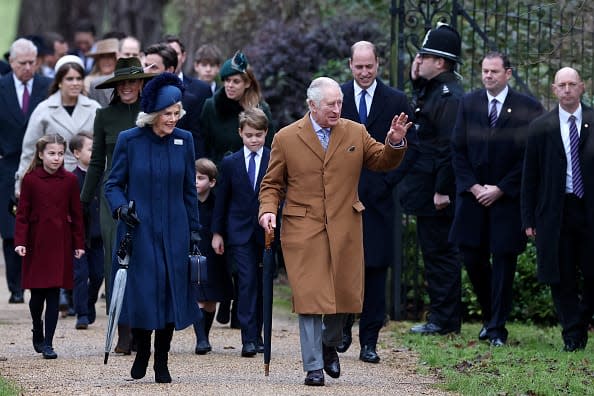
Princess Charlotte of Wales, Catherine, Princess of Wales, Camilla, Queen Consort, Prince George of Wales, King Charles III and Prince William, Prince of Wales attend the Christmas Day service at St Mary Magdalene Church on December 25, 2022 in Sandringham, Norfolk.
The simple fact is that the monarchy is very, very popular in the U.K. right now. Support for the monarchy is currently around about 55 percent, and it’s been at these levels—more or less between 50 and 60 percent—for decades. You will often hear pundits saying, on both sides, that the monarchy only exists by virtue of its popularity and that they have ratings that politicians would die for.
I actually don’t think popularity is key to its survival, or more accurately that unpopularity could cause its demise, for reasons that I’ll come on to below, but, very strangely, it appears that support for the monarchy has held up with the advent of the reign of King Charles.
You might have thought that he would be rather an unpopular monarch, given that he had an ongoing affair throughout his first marriage with the woman who ultimately became his second wife; that he behaved like a monster towards Diana; that he behaved very badly towards his children; that he has behaved very badly towards his aides; that he has been embroiled in multiple scandals which, were they to have happened to anybody else, would probably result in that person facing criminal charges; that he is arrogant; that he is petty; that he is extravagant… the list goes on but you get the picture.
His Christmas speech was delivered in that strangulated, whining tone of his. And yet, what he said was vaguely political, showing sympathy for those striking for better wages. Could we see the magic of Kingship in action? Will crowds be heartily singing God Save The King soon enough?
Clive: Yes, but that magic can swiftly disappear. A key part of his mother’s magic was that she seemed classless—literally, above class, in a space of her own. She seemed naturally companionable, somebody who developed into a maternal head of state with a soothing touch in times of trouble. All magic is a trick and this was no exception—one of the world’s richest women who appeared empathetic to the poorest of her subjects.
It’s not a trick that Charles can ever pull off. Moreover, as the country has grown poorer by all economic indicators he has become much richer. In two decades he turned the Duchy of Cornwall, his personal fiefdom, into a corporate powerhouse. Its main wealth lies in a huge land and property portfolio, valued at around $1.4 billion. Added to that now is his mother’s portfolio and wealth on which he pays no inheritance tax (other Brits pay 40 percent).
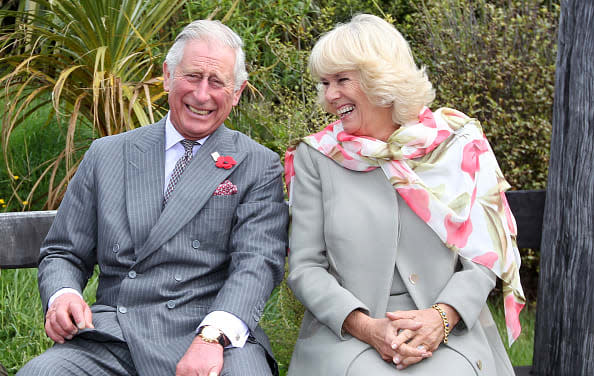
Charles and Camilla continue to laugh after a bubble bee took a liking to Prince Charles during their visit to the Orokonui Ecosanctuary on November 5, 2015 in Dunedin, New Zealand.
The king’s lifestyle is really that of a plutocrat rather than a democrat. He lives in a cocoon of entitlement. In his Christmas broadcast he made an effort to counter this impression. He could not have ignored that for the nation it was a winter of great discontent. Those who are most valuable to society—nurses, doctors, teachers, public transportation workers—are the least well rewarded and treated by the government like annoying mendicants.
Charles directly addressed that issue in a way that you, Tom, pointed out was bolder than anything his mother would have said. He’s always handicapped by his patrician delivery, in the tones of an after-dinner speaker with an epicurean bloom on his cheeks, but I felt he was really trying to reach out. It will, though, take more than piety and homilies to convince me that he can personally make any kind of difference.
Tom: OK, well, let’s talk about the money. Unlike you, I think the royals’ vast, unearned, inherited and largely untaxed wealth is one of the reasons they will be very hard to dislodge. It’s the second leg on which they stand. You are right that part of the genius of Queen Elizabeth (and Queen Victoria, per your Henry James quote) was to make people feel like she was a middle class granny.
But the fact is that the monarchy owns huge amounts of the land, property and natural resources of the United Kingdom, via the body known as the Crown Estate. The Crown Estate belongs to the reigning monarch, “in the right of the crown.” Much of it dates back to the 1067 Doomsday Book.
As you will know, of course, Clive, in 1760 George III made a deal with the government that the crown lands would be managed on behalf of the government, and the surplus revenue would go to the government, and in return the king was to get a fixed annual payment, and we still have a variation on that today. But as recently as 1961, the Crown Estate Act confirmed that the property actually belongs to the monarch. The value of the property owned by the crown is estimated in the Crown Estate’s annual reports at £15.6 billion.
I think that is a gigantic underestimate especially when you consider that it owns things such as the seabed up to 12 nautical miles around much of the foreshore of England, Wales and Northern Ireland.
I think if you get rid of the monarchy, you might well have to return the Crown Estate to the individuals who are, after all, the rightful owners of it, but have kindly agreed to lend it to the state. Even if you accept that the vast portfolio of the Crown estate is only worth a measly £15 billion, do you really want to pay £15 billion to get rid of the monarchy? I think that could be a major sticking point if this question ever seriously comes up.
Clive: No, the wealth could simply be treated like the wealth once owned by the church and incorporated in a state managed endowment, as was the wealth from British North Sea oil.
And discussion of the Crown Estate brings me to another imperative: admit and repent. A lot of the inherited wealth of the monarchy has its origins in slavery. Charles II initiated that in 1660 with the Royal African Company, set up to loot the natural assets of the colonies. Charles III needs to respond to the mounting demands from the former colonies for reparations. In the Caribbean, particularly, the scars of slavery are still felt—as William and Kate discovered on their very ill-prepared royal visit.
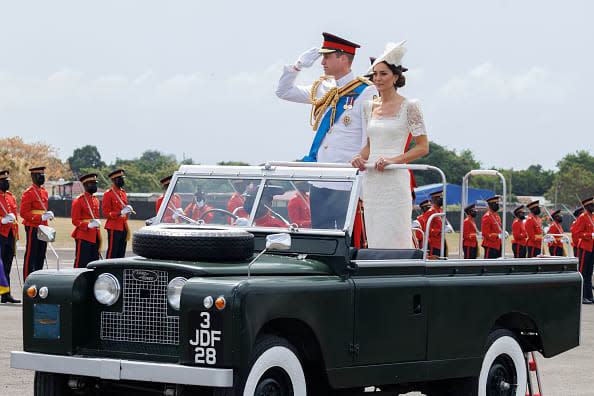
Catherine, Duchess of Cambridge and Prince William, Duke of Cambridge ride in a Land Rover as they attend the inaugural Commissioning Parade for service personnel from across the Caribbean with Prince William, Duke of Cambridge, at the Jamaica Defence Force on day six of the Platinum Jubilee Royal Tour of the Caribbean on March 24, 2022 in Kingston, Jamaica.
That episode revealed far more than a deaf ear about the toxic legacy of slavery. It shone a light on a persistent undercurrent of racism in the royal household.
Meghan Markle’s shock at encountering this racism is clear enough. She has paid a high price for exposing it—as though it was a breach of manners even to raise the subject. And beyond the Palace, vilifying her for being so bold has become a blood sport.
The basest of her detractors, Jeremy Clarkson, seemed to experience an attack of uncontrollable primal male rage, during a nocturnal vision (shamefully conveyed in the pages of the Sun) where she was paraded naked through the streets and bombarded with excrement.
Take what you like from that about Clarkson’s inner sickness, but even more house-trained critics like Piers Morgan harangue Meghan (and Harry) in tones that are primitive and ugly. Morgan’s own problem is a severe case of possession denial. He took the exit of the Sussexes personally, as though they betrayed him, the Windsors and the nation and, in his flights of ranting self-importance, thinks that he speaks for people who can’t speak up for themselves.
The reality is Meghan chose not to be pals with Morgan, and he has been frothing in crazed bitterness ever since. The irony is that Harry and Meghan should speak up, about these vile scourges that the Palace should condemn and disavow. Instead: not a murmur. Know them by the company they choose to keep.
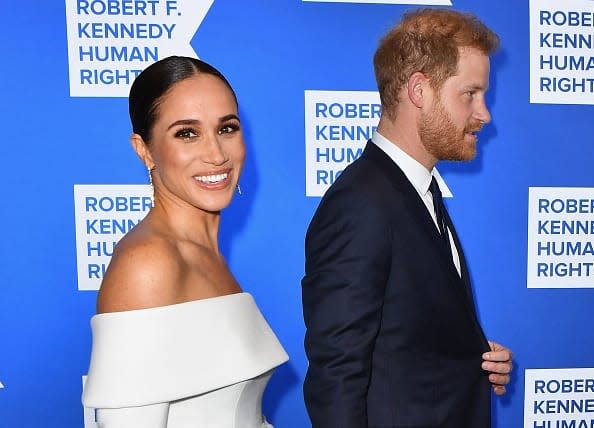
Prince Harry, Duke of Sussex, and Megan, Duchess of Sussex, arrive for the 2022 Ripple of Hope Award Gala at the New York Hilton Midtown Manhattan Hotel in New York City on December 6, 2022.
And I have to say that this contrasts strikingly with the way they handled the Lady Hussey episode, where the charity head Ngozi Fulani received a fulsome apology for the way Hussey interrogated her on her racial origins. The two had a “warm and understanding” meeting at the Palace and Hussey pledged to “learn more about the issues in this area.”
The Palace added that Fulani had “unfairly received the most appalling torrent of abuse”—that is, to be clear, from a lot of the same gang of trollers who pursue Meghan. Some had rolled their eyes at Harry and Meghan receiving a prestigious award in New York recently for fighting racism, but the Fulani incident and the awful Clarkson column—Meghan rightly dismissed the Sun’s non-apology for it—showed just how on the money in their criticisms Harry and Meghan have been.
None of this is going to go away. The history of the monarchy and racism is breaking out of a couple of centuries of calculated avoidance and suppression.
There should be a kind of Truth and Reconciliation Commission, as a preamble to establishing a designed-for-purpose museum that records the personal histories of slavery in the way that several holocaust memorials have so powerfully done. A piece of Crown Estate property in central London would be a good site.
Tom: OK, well, let’s imagine it’s 2031, Charles is making a mess of everything, the royals are deeply unpopular at home, and a way has been found to sort out the Crown Estate issue. You still have to reckon with their constitutional position, which is made even stronger by the fact that it is totally opaque.
The U.K. constitution is famously not written down, so nobody knows exactly what the position of the king legally is. Therefore, it is very hard to deconstruct his authority because nobody knows what his authority is actually based on; there is nothing to unpick, there is no argument to interrogate. You are arguing against a void. That is a very difficult thing to argue against.
Clive: It’s not such a void, it’s just that it seems to be disembodied because that’s how they want you to think about it. There’s a very subtle equipoise between the monarchy and the political class, each seeking to further its own agenda. In fact, the monarchy isn’t a stand-alone institution. It’s part of a shadow power system including the government and the civil service. This is not working out too well for Charles.
You’ll recall that his arrival on the throne coincided with the arrival of a new prime minister, Liz Truss. She lasted all of fifty days and nearly bankrupted the country but one of her first acts was to stop Charles going to Egypt for the world climate summit. It would have been a helpful step for him to make clear that his long activism on climate change would now be boosted by the added status of a monarch. He had been highly visible at the previous year’s summit in Glasgow and the queen, too frail to attend, appeared remotely to show her own support.
But climate change was not on Truss’ agenda and she cut him off at the knees—an extraordinary impertinence and unthinkable while his mother was on the throne. To be fair, Charles did claw back some ground by giving a reception at Buckingham Palace for delegates on their way to Egypt, but his frustration was obvious.
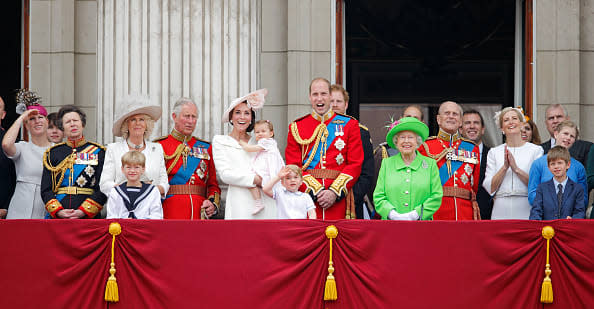
Zara Phillips, Princess Anne, The Princess Royal, Camilla, Duchess of Cornwall, Prince Charles, Prince of Wales, Catherine, Duchess of Cambridge, Princess Charlotte of Cambridge, Prince George of Cambridge, Prince William, Duke of Cambridge, Prince Harry, Queen Elizabeth II, Prince Philip, Duke of Edinburgh, Peter Phillips, Sophie, Countess of Wessex, James, Viscount Severn, Lady Louise Windsor, and Prince Andrew, Duke of York watch the flypast from the balcony of Buckingham Palace during Trooping the Colour, this year marking the Queen's 90th birthday on June 11, 2016 in London, England.
The constitutional point is that, hidden in the fog of the “unwritten” legend are real controls on royal power—the power to both constrain and to enlist, according to political need. A little-known body, the Royal Visits Committee, brings together the private secretaries of Charles, William and the prime minister—all of them of the unelected mandarin class, groomed in either the civil service or military. When they needed Charles to meet with Gulf and Saudi monarchs over the last decade to further commercial and military interests he obliged, making 95 trips including to some very repressive regimes.
It’s also worth noting that the first state reception for a foreign head of state given at Buckingham Palace in Charles’s reign was for the president of South Africa, Cyril Ramaphosa. In November an inquiry launched by the South African parliament found that Ramaphosa had stashed away $580,000 in a sofa acquired in a deal involving the sale of buffaloes. As bizarre as this was, Ramaphosa has survived calls for his impeachment, although his regime is widely described as an “unreformable” kleptocracy. Many governments have to hold their nose as they cultivate and sustain their commercial interests. In Britain, the monarchy has no choice but to be an accessory.
Tom: I take your point; the royals do have to do what they are told. They are above the law but they are (often) not above the government.
But the other point about the constitutional issue is that it leads inevitably into another question: What would happen if you got rid of the king? Who would you replace them with? I think after the disaster of the Brexit referendum there is absolutely no appetite to have another referendum in the U.K. ever again, and I think one of the lessons of Brexit is that opponents would have to be very clear what was going to replace it.
So in opposition to this quite nebulous situation that we have at the moment with the monarchy, that has developed over centuries, abolitionists would be having to propose every detail of the new system: who would be eligible to vote? Who would be eligible to stand? Would every adult human in the country be able to nominate themselves? If not, why not? How would the process work? Would the political parties be allowed to put forward a candidate? Would it be one man, one vote? Would the regions be weighted? How would we feel about Donald Trump being king?
On a side note this leads me into one of the more compelling arguments for the monarchy, which was first made to me by Nikolai Tolstoy, the president of the International Monarchist League. He told me that one of the main reasons he supports the monarchy is because the kind of people who would campaign to be king or president are typically attention seekers, and completely unsuitable to the job. Members of the Athenian Council under Cleisthenes were selected by lot for this very reason.
Clive: I’m not agitating for abolition. I just think that the current royal family model is totally unsustainable and will collapse if it doesn’t completely reform, top to bottom, and I don’t believe that Charles has the leadership skills to undertake what needs to be done to ensure its survival – to strip the institution of its many excesses, and to make it far more transparent and accessible.
Dynasties—whether royal or corporate—are always vulnerable to the risks of hereditary succession. Edward VIII was a dud, with George VI and Elizabeth II we got lucky. On the optics alone, without his other failings, Charles does not come close to resembling the kind of boss that The Firm needs now, to navigate the business through the next two decades or so. Charles and Camilla, William and Kate. Which pairing looks right to meet the moment?
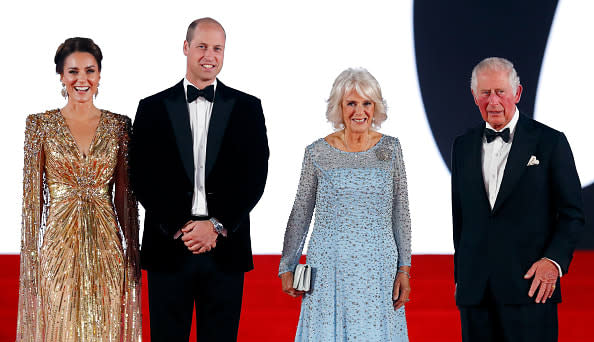
Catherine, Duchess of Cambridge, Prince William, Duke of Cambridge, Camilla, Duchess of Cornwall and Prince Charles, Prince of Wales attend the "No Time To Die" World Premiere at the Royal Albert Hall on September 28, 2021 in London, England.
William has worked hard not to be a Spencer. He has grown convincingly into a Windsor. In effect, he’s been captured by them. The upside of that is no surprises, nothing impulsive. The downside is a robotic performance at the rostrum, fully on display during the Caribbean fiasco—essentially a lack of the Spencer magic spontaneity. But that’s OK. The steady hand, the admirable wife and family—good equipment for the job ahead, but only if Charles has the good sense to let the Cambridges have equal standing on the stage and a strong influence behind it. Do you think he’s capable of that?
Tom: I think he probably can. I thought the Christmas message was a pretty good start. Queen Elizabeth is a hard act to follow, but, wow, has she built up some amazing foundations for him to stand on!
Clive: Elizabeth II rarely seemed to be left behind where her country was headed. Proof of this came on the opening night of the 2012 London Olympics. The queen artfully collaborated in the James Bond stunt, where a body double for her parachuted into the arena.
The Britain that was being celebrated that night was multicultural and totally at ease with its new identity—around 15 percent of the population was foreign-born (closer to 40 percent in London), following several generations of immigrant families from the empire and colonies.
The sense of what being British meant had been broadened, not narrowed. That didn’t appear to bother the queen at all. Then came the rise of a new nativism, driven in part by xenophobia and racism. Brexit aggregated a strange, muddled sense of grievance about lost power and phantom external threats. The queen was powerless to avert that disaster, though it was clear she didn’t welcome it.
If Charles is really serious about bringing the monarchy closer to the people, he could start by following the example of the Louvre, and take the enormous treasures in the Royal Collection and turn over the whole of Buckingham Palace to displaying them. There are so many riches hidden away that the shows could rotate, as well as pull in other royal collections to demonstrate the historical role of royal patronage around the world in producing some of the world’s greatest art.
Tom: I think he will absolutely do something like that. He has no desire to live in that building so it would solve that problem for him too.
Clive: Charles now faces the possibility of the dismemberment of the union with Scotland and Northern Ireland. That union is part of the argument for the monarchy’s role, as mortar in the foundations of the nation. The coronation in May can either look like business as usual—medieval ritual in fancy dress with accompanying celestial choir—or better reflect the world as it really is and a king that lives in this century.
As you argue, Tom, the best argument for the monarchy is that none of the alternatives looks appealing (although other democracies have worked them out quite well). Maybe Charles can find it within him to meet the tests. I hope so, but I doubt it.
Tom: I think the complexities of getting rid of a monarch explain why the only way it has ever been done successfully is to cut off their heads.
Get the Daily Beast's biggest scoops and scandals delivered right to your inbox. Sign up now.
Stay informed and gain unlimited access to the Daily Beast's unmatched reporting. Subscribe now.

